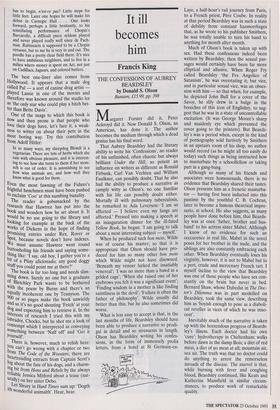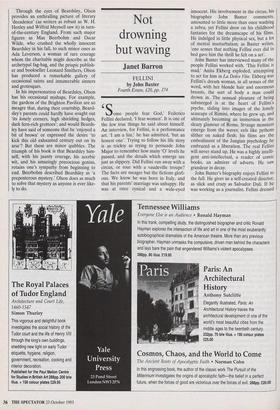It ill becomes him
Francis King
THE CONFESSIONS OF AUBREY BEARDSLEY by Donald S. Olson Bantam, £15.99, pp. 398 Margaret Forster did it, Peter Ackroyd did it. Now Donald S. Olson, an American, has done it. The author becomes the medium through which a dead genius has his final word. That Aubrey Beardsley had the literary ability to write his 'Confessions', no reader of his unfinished, often chaotic but always brilliant Under the Hill, so potent an influence on writers as different as Ronald Firbank, Carl Van Vechten and William Faulkner, can possibly doubt. That he also had the ability to produce a narrative as camply witty as Olson's, no one familiar with his life can possibly doubt either. Mortally ill with pulmonary tuberculosis, he remarked to Ada Leverson: 'I am so affected — I believe even my lungs are affected.' Pressed into making a speech at an inauguration dinner for the ill-fated Yellow Book, he began: 'I am going to talk about a most interesting subject — myself.' When he produced such bon mots, Wilde was of course his master; so that it is appropriate that Olson should have pro- duced for him so many other bon mots which Wilde might not have disowned. `Beneath my veneer lurked the insatiably venereal'; 'I was no more than a bawd in a gelded cage'; 'When she raised one of her eyebrows you felt it was a significant event'; `Finding wisdom in a mother is like finding saintliness in the devil'; 'Failure is often the father of philosophy'. Wilde usually did better than this; but he also sometimes did worse.
What is less easy to accept is that, in the last months of life, Beardsley should have been able to produce a narrative so prodi- gal hi detail and so strenuous in length. Olson has Beardsley writing his confes- sions, in the form of immensely prolix letters, from a hotel at St Germain-en- Laye, a half-hour's rail journey from Paris, to a French priest, Pere Coube. In reality at that period Beardsley was in such a state of debility from constant haemorrhages that, as he wrote to his publisher Smithers, he was totally unable to turn his hand to anything for month after month.
Much of Olson's book is taken up with sex. Had these confessions indeed been written by Beardsley, then the sexual pas- sages would certainly have been far more elliptical and allusive. When Roger Fry called Beardsley 'the Fra Angelico of Satanism', he was overstating it; but vice, and in particular sexual vice, was an obses- sion with him — so that when, for example, he depicted John Bull for a cover of the Savoy, he slily drew in a bulge in the breeches of this icon of Englishry, to sug- gest that he was in a state of uncontrollable excitation. (It was George Moore's sharp and maidenly eye which prevented the cover going to the printers). But Beards- ley's was a period when, except in the kind of pornography sold furtively by Smithers in an upstairs room of his shop, no author would record (as he might all too easily do today) such things as being instructed how to masturbate by a schoolfellow or taking part in a gang-bang.
Although so many of his friends and associates were homosexuals, there is no evidence that Beardsley shared their tastes. Olson presents him as a frenetic masturba- tor — having first been inducted into this pastime by the youthful C. B. Cochran, later to become a famous theatrical impre- sario, at school. He also suggests, as many people have done before him, that Beards- ley was at once 'father, brother and hus- band' to his actress sister Mabel. Although I know of no evidence for such an occcurence in real life, Mabel in the novel poses for her brother in the nude, and the siblings are also constantly embracing each other. When Beardsley eventually loses his virginity, however, it is not to Mabel but to a pert, crude and mercenary French tart. I myself incline to the view that Beardsley was one of those people who have sex con- stantly on the brain but never in bed. Bernard Shaw, whose Dubedat in The Doc- tor's Dilemma was in part modelled on Beardsley, took the same view, describing him as 'boyish enough to pose as a diaboli- cal reveller in vices of which he was inno- cent'.
Inevitably much of the narrative is taken up with the horrendous progress of Beards- ley's illness. Each doctor had his own `cure': hydrotherapy in Cheltenham; walks before dawn in the damp Bois; a diet of red meat, a diet of no meat at all; mountain air, sea air. The truth was that no doctor could do anything to arrest the remorseless inroads of the disease. The marvel is that, while burning with fever and coughing blood, Beardsley continued, like Keats and Katherine Mansfield in similar circum- stances, to produce work of remarkable quality. Through the eyes of Beardsley, Olson provides an enthralling picture of literary `decadence' (as writers as robust as W. H. Henley and Wilfrid Meynell saw it) in turn- of-the-century England. From such major figures as Max Beerbohm and Oscar Wilde, who crushed the wholly innocent Beardsley in his fall, to such minor ones as Ada Leverson, a woman of rare courage whom the charitable might describe as the archetypal fag-hag, and the priapic publish- er and bookseller Leonard Smithers, Olson has produced a remarkable gallery of occasional saints and innumerable sinners and grotesques.
In his impersonation of Beardsley, Olson has his occasional mishaps. For example, the gardens of the Brighton Pavilion are so meagre that, during their courtship, Beard- sley's parents could hardly have sought out `its lonely corners, high shielding hedges, dark fern-rich grottoes'; and would Beards- ley have said of someone that he 'enjoyed a bit of brown' or expressed the desire `to kick this old exhausted century out on its arse'? But these are minor quibbles. The triumph of his book is that Beardsley him- self, with his jaunty courage, his acerbic wit, and his amazingly precocious genius, retains one's sympathy from beginning to end. Beerbohm described Beardsley as 'a preposterous mystery.' Olson does as much to solve that mystery as anyone is ever like- ly to do.



































































 Previous page
Previous page